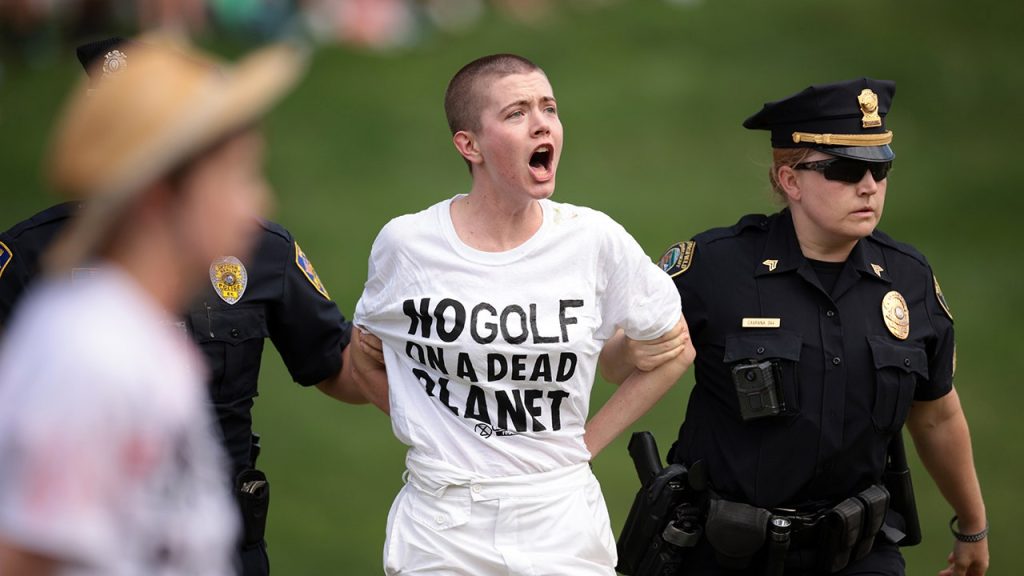During the final hole of the Travelers Championship at TPC River Highlands, police tackled protesters on the 18th green. Scottie Scheffler, who was aiming for the victory, was interrupted by multiple protesters rushing onto the course in Cromwell, Connecticut. The protesters let off gas canisters as police hurried to apprehend them. Golf fans responded with boos and profanities as authorities worked to remove the protesters as quickly as possible. Some of the protesters wore t-shirts with the extinction symbol and the slogan “No golf on a dead planet,” indicating their status as climate change activists.
The protesters’ demonstration occurred during a critical moment in the tournament, as Tom Kim needed a birdie to force a playoff against Scheffler. Kim managed to achieve this, finishing with a 66, while Scheffler had posted a 65 on the day. This incident is not the first instance of protesters disrupting sports events, as climate activists have been seen at NFL games and others have attempted similar actions at NBA contests. Despite the disturbance, the tournament continued, with all protesters eventually being handcuffed and removed from the grounds by the authorities. In the end, Scheffler clinched his sixth win of the season and his second playoff victory, securing the championship two days after his 28th birthday.
The protesters at the Travelers Championship wore t-shirts with the extinction symbol and a message advocating against golf on a dead planet, highlighting their concern for climate change. This demonstration of activism interrupted the competition, leading to a brief pause as police addressed the protesters. The incident drew negative reactions from golf fans, with many expressing disapproval at the disruption caused by the protesters. Despite the commotion on the 18th green, play eventually resumed, allowing Tom Kim to force a playoff against Scheffler, who ultimately emerged victorious with a second par on the 18th hole.
The actions of the protesters, who brought gas canisters onto the course and wore t-shirts with symbolic messages, resulted in a heightened sense of tension and confusion among players, officials, and spectators. While the disruption was quickly addressed by authorities, the incident left a lasting impact on those present at the Travelers Championship. The protest reflected a growing trend of activism within the sports world, where individuals and groups use high-profile events to draw attention to environmental and social issues. Despite the challenges posed by such disruptions, the tournament ultimately proceeded as scheduled, with Scheffler emerging as the victor after a hard-fought playoff against Kim.
The presence of protesters at the Travelers Championship and their subsequent disruption of play underscored the complex intersection of sports and activism. As climate change continues to be a pressing global issue, it is not surprising that activists are utilizing sports events as platforms to raise awareness and demand action. The protesters’ choice to target a golf tournament, a sport often associated with environmental concerns due to its impact on land and resources, further emphasized their message about the urgency of addressing environmental issues. While the incident may have temporarily overshadowed the competition, it also served as a reminder of the power of sports as a catalyst for social change and discourse.
The Travelers Championship at TPC River Highlands will be remembered not only for the competitive golf on display but also for the unexpected intrusion of activists onto the course. The incident highlighted the complexities of balancing sports entertainment with social and environmental concerns, prompting discussions about the role of athletes, fans, and organizers in addressing pressing global issues. As Scheffler celebrated his victory and the tournament came to a close, the protest served as a thought-provoking moment that challenged the status quo and emphasized the need for meaningful dialogue and action on climate change and other critical issues facing society today.


